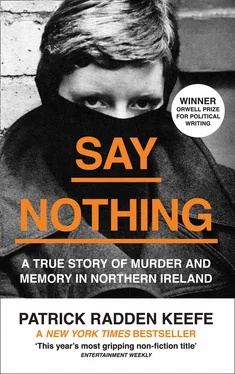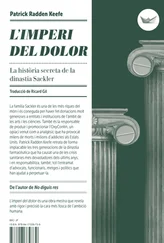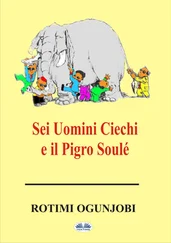Army headquarters at Lisburn lay eight miles outside Belfast, behind fortified blast walls lined with sandbags and barbed wire. The number of British troops in Northern Ireland had escalated dramatically in a short period of time: during the summer of 1969, there were 2,700; by the summer of 1972 there were more than 30,000. The soldiers were often just as young and inexperienced as the paramilitaries they were fighting: gangly, pimply, frightened young men who were scarcely out of their teens. They were spread across the country, at bases and barracks and makeshift billets. Two companies of Black Watch soldiers were billeted in a vast aircraft hangar. Another company resided in a bus depot, where soldiers bunked down in empty buses. The soldiers were being deployed to Northern Ireland for four-month tours, before rotating home again.
It could be a hugely dangerous assignment, with a multitude of armed factions blending into close-knit communities. In light of the constant risk of getting picked off by a sniper or torn apart by a homemade bomb, some of the more introspective soldiers were forced to wonder: What would success look like? How would you define victory? They had been sent to Northern Ireland to quell the unrest during the summer of 1969, but since their arrival, the bloodshed had only intensified. What would they have to achieve before they could all go home? The army that deployed in the Troubles was not the army that had fought the Nazis. It was an organisation that had come of age fighting small wars of colonial disentanglement. But what was Northern Ireland? Was it part of the United Kingdom? Or was it one of those restive colonies?
When Frank Kitson arrived, in 1970, he was not the overall commander of British forces. But he was in charge of the army’s 39 Airportable Brigade, which had responsibility for Belfast, and his influence far exceeded his station. As one of Kitson’s subordinates later put it, ‘Within his area of responsibility he was the sun around which the planets revolved, and he very much set the tone.’
The biggest challenge facing the army when Kitson arrived was a shortage of solid intelligence. The men and women who became paramilitaries, whether republican or loyalist, looked like everyone else in the civilian population. So how to identify them? In previous decades, the membership of the IRA had been relatively static – the same names came up year after year. But the old police files were in desperate need of an update, now that there were new recruits flocking to the cause every week. This difficulty was only exacerbated by the blunderbuss approach favoured by the army. ‘When I was first there, the tactics were rather to stand in a line, pump the place full of gas, and let people chuck bricks at you until they got tired of it,’ Kitson later recalled. ‘Not a very good idea because the gas did so much damage to the local people. It made them hostile.’
In Low Intensity Operations , Kitson had observed that the aim in counter-insurgency situations should be to ‘destroy the subversive movement utterly’. But it’s difficult to destroy a target that you cannot see. Kitson became obsessed with intelligence. The first challenge is always ‘getting the right information’, he liked to say.
In particular, Kitson was interested in D Company of the Belfast Brigade, the IRA unit operated by Brendan Hughes and the one that was doing the most damage. British soldiers referred to Hughes’s operational area in West Belfast as ‘the reservation’ – Indian country, where soldiers should tread carefully, if at all. Among themselves (and occasionally in the press) the soldiers would decry their adversaries’ lack of humanity, saying, ‘These people are savages.’ Hughes and his men were out there, invisible and silent, embedded in the community. At Palace Barracks, outside the city, where many of the soldiers were stationed, you could hear the bombs going off in Belfast at night. The windowpanes would shudder.
With blasts in central shopping areas, you might suppose that the army would have no trouble finding frightened or disaffected civilians who were willing to help them by furnishing information. But soldiers complained that in West Belfast, a ‘wall of silence’ protected the IRA. Informers were known as ‘touts’, and for centuries they had been reviled in Irish culture as the basest species of traitor. So there was a profound social stigma against cooperating with the British.
Brendan Hughes was not the only one with a habit of quoting that Mao line about the fish and the sea. Kitson liked it, too. But he put his own spin on the sentiment. A fish can be ‘attacked directly by rod or net’, he advised. ‘But if rod and net cannot succeed by themselves it may be necessary to do something to the water.’
Just before dawn one morning in August 1971, three thousand British troops descended on nationalist areas across Northern Ireland. Soldiers broke down doors and dragged men from their beds, hauling them off to internment. Under the Special Powers Act, it was legal to hold someone indefinitely without trial, and internment had been used periodically in Northern Ireland. But not on this scale. Of the nearly 350 suspects arrested that day, not a single one was a loyalist, though there were plenty of loyalist paramilitaries engaged in terrorism at the time. This disparity in treatment only compounded the impression, in the minds of many Catholics, that the army was simply another instrument of sectarian oppression. In planning the sweep, the army had relied on intelligence from the RUC, and, as one British commander later acknowledged, the largely Protestant police force consisted of people who were ‘partial to one extent or another, in many cases, to a considerable extent’.
But the lists of suspects that the RUC produced were not merely skewed to target Catholics – they were also out of date, and included many people who had no involvement whatsoever in the armed struggle. Because of the Irish tradition of naming sons after their fathers, elderly men were dragged off under the mistaken assumption that they were their sons, and sons were arrested because the authorities thought they were their fathers. (Sometimes, finding both father and son at home and uncertain about which one they were after, the army simply took both.) Nearly a third of the suspects seized that morning were released after two days. The army had arrested a bunch of people it wasn’t looking for while failing to arrest most of the people it was looking for, all while further embittering a Catholic population that was highly embittered to begin with. An official study by the British Ministry of Defence later conceded that internment had been ‘a major mistake’. In the words of one British officer who took part in the sweep, ‘It was lunacy.’
As the presiding counter-insurgency intellectual in Northern Ireland, Frank Kitson would forever be associated with internment. But he would later insist that he had not approved of the decision – that, on the contrary, he had warned his superiors that such a measure would prove counterproductive. His quarrel was not so much with the use of the practice in general as with the specifics of its application in this instance. Kitson had endorsed the use of internment in Kenya and elsewhere. While allowing that it was ‘not an attractive measure to people brought up in a free country’, he argued that internment could nevertheless shorten a conflict, ‘by removing from the scene people who would otherwise have become involved in the fighting’. He reportedly quipped, of locking people up without trial, ‘It’s better than killing them.’ This view may seem callous in retrospect, but the sentiment was echoed at the time in the British press. The Telegraph suggested that some of the Catholics who were locked up without charge ‘admit to preferring internment to the chances of being shot outside’.
Читать дальше












![Helen Rowland - The Widow [To Say Nothing of the Man]](/books/752764/helen-rowland-the-widow-to-say-nothing-of-the-man-thumb.webp)